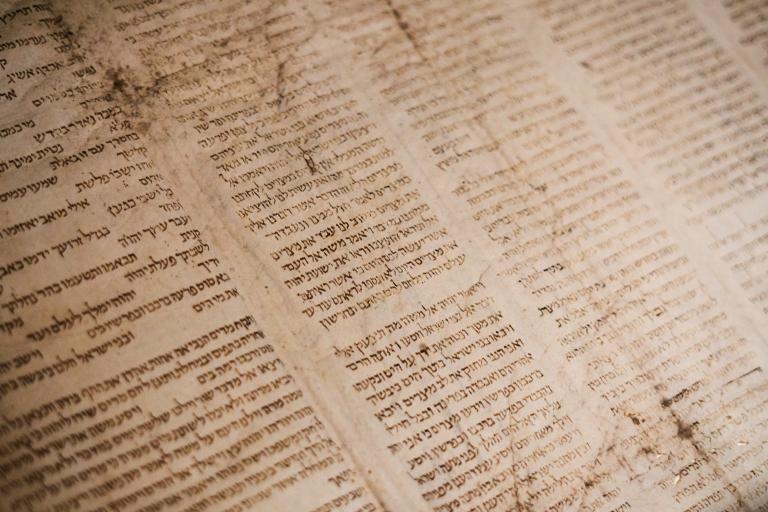
It is odd that Jesus at no point in the four gospels quotes any material past chapter 39 of Isaiah as having actually come from Isaiah. Is it possible that this is because Jesus, like the Gospel of Mark, knew what the Dead Sea Scrolls knew, that there was more than one author?
INTRODUCTION
When discussing Biblical Scholarship with friends or family, and certainly strangers, nothing can cause more curiosity, consternation or confrontation than the issue of authorship. Within a conservative theological context, you can discuss issues regarding the original languages, whether verses belong or do not within the Bible and even the question of God’s very existence, but should you question as a Christian who wrote the book your debating a verse within, suddenly all hell usually breaks loose.
Why are you doubting Scripture? they ask.
A very famous example of this sort of contentious issue is the Book of Isaiah.
For well over a hundred years, Biblical Scholars have come to agree overwhelmingly that the book of the prophet Isaiah does not in fact only stem from the historical man Isaiah himself, but two or three other prophets who followed after him (likely his disciples).
3 ISAIAHS?
Creatively named 2nd and 3rd Isaiah by Biblical Scholars (or Deutero and Trito for the nerds), these two other prophets in Israel’s history were anonymous, meaning that they chose not to write down for memorial what their names were. The book of Isaiah does not list for us their names, though 2nd Isaiah describes himself as a “voice crying in the wilderness” (Is. 40:3).
In truth, they chose to have their actual ministries speak louder than their names and more importantly, they saw their work as not unique, but a continuation of the work God began with Isaiah, which is why their writings are now attached to his.
Since they saw themselves as simply messengers, merely continuing the divine voice that Isaiah began to speak for, they humbled themselves and allowed their prophecies/messages to speak instead of them.
So how exactly then, if this is the case, is the book of Isaiah divided into three sections?
- The first section (1st Isaiah), is the work of the historical prophet Isaiah who lived in the 8th century (encompassing chapters 1-39).
- The second part of the book (2nd Isaiah) is the work of an anonymous prophet, who likely lived during the Exile of the Babylonians in the 6th century (encompassing chapters 40-55).
- The third section and the smallest, known as 3rd Isaiah, appears to have been written in the 5th century by an anonymous prophet who lived somewhere around the time of the return of the Exiles from captivity (encompassing chapters 56-66).
To some, this can sound frightening.
To others, fascinating.
It just depends on how someone teaches it to you, or how they try to scare you away from it.
WHY DO SOME OBJECT TO THIS?
Some conservative Christians primarily dislike the idea because of what it means for the prophecy about Cyrus of Persia in Isaiah 45. This prophecy predicts that God is behind the victories of the Persian leader Cyrus and that this man will “set my exiles free.”
Thus says the Lord to his anointed, to Cyrus, whose right hand I have grasped to subdue nations before him and strip kings of their robes, to open doors before him— and the gates shall not be closed… 5 I am the Lord, and there is no other; besides me there is no god. I arm you, though you do not know me, 6 so that they may know, from the rising of the sun and from the west, that there is no one besides me; I am the Lord, and there is no other… 13 I have aroused Cyrus in righteousness, and I will make all his paths straight; he shall build my city and set my exiles free, not for price or reward, says the Lord of hosts…
Because Isaiah lived over a hundred years prior to Cyrus’ birth, some early readers got very excited and assumed that Isaiah had not only predicted the actions of Cyrus, but even his very future existence! However, this assumption does not hold weight if it is true that there were two other authors of Isaiah.
If 2nd Isaiah, a later prophet after Isaiah died, was the one who penned this prophecy, it means that the prediction was not given around 150 years before he was born, but perhaps either
- at his birth or
- soon after
This would mean that Isaiah was prophesying not of the birth of Cyrus at all, but rather his eventual life decisions as a future leader. This makes more sense of the text since the prophecy never mentions Cyrus as someone who will be born, but rather as someone already born.
In the end, that’s almost the only reason some evangelicals dislike the idea of multiple authorship for Isaiah and as such, they often portray those who promote it as people who simply want to take away the power of prophecy. Of course, this is the opposite of truth, the idea doesn’t do that at all; it only changes what the prophecy was about or how early it was. Nonetheless, it remains prophetic.
It’s important to understand that this is their real sole objection (and to understand how and why its flawed), so that way we can weigh the evidence against it and see whether this should be a divisive issue at all.
EVIDENCE FOR THE THEORY
First of all, let me explain to you why scholars believe that the book of Isaiah should be divided into these two or three sections.
- The biggest reason is that although the first forty chapters actively describe the prophecies as coming from Isaiah and include stories that describe the circumstances of those messages, the chapters that follow afterward neither contain any stories describing anything (nor does it ever say that any of those messages derive from Isaiah). The change is dramatic and noticeable.
- Not only that, but the subject matter changes. Whereas before the book was initially discussing Assyria and issues that existed at the time of Isaiah, the later chapters talk about Babylon and issues that wouldn’t be relevant to Israelites for at least over a hundred more years. (This is not to deny the possibility of predictive prophecy, but simply to point out that the book of Isaiah does not seem to be prophesying per say, but is describing a historical situation that it expects its readers to be aware of already, a situation which no one in Isaiah’s day was or could be aware of.)
- Other strange issues include the fact that the later chapters describe Israel as already in Babylonian captivity and the last chapters describe Israel as having already returned from that same captivity.
- The Hebrew language itself in the book actually changes depending on what section you are reading!
Those things taken together, with many other nuanced reasons, have led scholars for the past few centuries to argue that the “Book of Isaiah” is actually the “Books of Isaiah.”
Of course, the implication looms large: is it really the case that all this time we didn’t realize this?
The interesting thing is that, regardless of our own past ignorance, it appears that the Jews (or at least some) at the time of Jesus were still aware of the issue of authorship.
THE DEAD SEA SCROLLS
When the Dead Sea Scrolls were discovered in 1947, one of the most significant that was still intact was known as “The Great Isaiah Scroll.” This large and well preserved copy of Isaiah, dating 150 years or so before Jesus’ birth, had a curious feature in its text.
It had a gap.
To be precise, it skipped a line between the text of one finished verse and the beginning of another, leaving one line in the scroll empty. The gap is notably intentional and more so, this is completely unusual and is not to be seen in any other scroll.
What’s fascinating, is that the gap is around the same part of the scroll (chapter 40) that scholars argue is the point in which 1st Isaiah changes to 2nd Isaiah!
The gap however is not exactly at the spot scholars suspect, which implies for us that the scribe who copied Isaiah was aware that there were at least two different books and likely two different authors, but the precise nature of both was likely becoming forgotten by the time of the Maccabees (167BCE, about the period in which the book of Daniel began to be compiled together as a single book).²
So we know pretty well that for a time in Judah’s waning history, they were still aware of this and it was commonly known.
LATER MEMORIES
What about at the time of the New Testament? Did anyone still remember?
Since scrolls like the Great Isaiah Scroll were still being read in the time of Jesus, gap and all, it was certainly possible that the knowledge was preserved for some, however imperfectly.
And in fact, it actually does appear that some at the time of Jesus did remember!
The Gospel of Mark, the first of our four gospels, appears to have still been aware of the difference between the Isaiahs (to what degree though is a guess).
He refers to 1st Isaiah explicitly as “Isaiah” (Mark 7:6), but refers to a passage from 2nd Isaiah as ambiguously “Is it not written?” (Mark 11:17).
Likewise, he either refers to another passage in Mark 1:2 as
“written in Isaiah the prophet” (which does not allude to authorship but the location in a scroll)
or as some manuscripts read: “in the prophets.”¹
The later Gospels of Luke, Matthew and John however, appear to be unaware of any differences between the two sections. They identify later parts of Isaiah’s book with Isaiah by name, unlike Mark.
So it appears that by the latter half of the first century, early Christians and Jews were forgetting this aspect about Isaiah.
Yet, there is an odd coincidence that I once observed when researching this issue and I feel that it deserves discussion (and future research).
DID JESUS KNOW?
If you only look at the times that the Gospels have Jesus quoting Isaiah, something strange can be observed.
1. Jesus only refers to passages from 1st Isaiah as explicitly written by “Isaiah” (Matthew 13:14-15; Mark 7:6-7)
2. Jesus is never recorded as personally describing any passage from outside those first 39 chapters as being written by Isaiah.
3. He only refers to passages from 2nd and 3rd Isaiah as “It is Written” (Mt 21:13; Mk 11:17; Lk 19:46), calls them simply “Scripture” (Luke 22:37) or describes the given passage as “written in the Prophets” (John 6:45).
It is odd that Jesus at no point in the four gospels quotes any material past chapter 39 of Isaiah as having actually come from Isaiah. Instead, he opts for vague references to scripture and prophecy, as if purposefully avoiding mixing up two different authors.
Is it possible that this consistency derives from the Historical Jesus and demonstrates that he, like it appears Mark, knew what the scribe 150 years or so earlier knew when he copied the Great Isaiah Scroll? I believe so.
Isaiah was one of the most widely used books by Jesus in his earthly ministry and it only makes sense that he would be well aware of its authorial traditions.
NO DECEPTION
Some conservatives at times argue that this view implies that the other two “Isaiahs” are imposters who have deceived countless into thinking that they are the same as the first.
What the Dead Sea Scroll copy of Isaiah (along with other books) demonstrates is that the Jews were well aware of the difference for a time. No deception was at work at any point. They knew they weren’t the same.
Moreover, it would be helpful to remind ourselves that before the work that we now call 2nd Isaiah (and 3rd) was written down, the scroll of Isaiah only consisted of chapters 1-39.
That means that the Jewish people in the 5th or 4th century B.C.E. (after some 2-300 years of having the earlier scroll of Isaiah) made the decision to add the new material. The scribes copying the book and the communities that read it had to both agree to the change, otherwise they could have just rejected the new prophetic material and kept Isaiah limited to 39 chapters.
As such, it is not merely that the author of 2nd or 3rd Isaiah fancied themselves a continuation of Isaiah’s earlier ministry, but rather both the scribes and people agreed that this was the case.
So who are we to disagree with them?
CONCLUSION
The point of all of this is to show that Biblical Scholarship is not by any means attempting to remove a fantastic prediction about Cyrus due to some conspiratorial reason, but is honestly examining the evidence both within the book of Isaiah and the evidence of ancient documents to rediscover what was once lost to time as knowledge.
Those scholars who support the multiple authorship of Isaiah do not do so because of some a-priori bias in favor of rationality over and against prophetic interpretations. I for one as a Christian have no problem with affirming the Bible’s ability to predict the future ahead of time (Jeremiah anyone? Jer. 25:11-12).³
By affirming 2-3 additional writers of Isaiah, no one takes away the fact that this is a predictive prophecy: it merely changes either by how early the prediction was made or what the precise thing being predicted is (for example: Cyrus’ future birth vs. Cyrus’ future mission).
In the end, perhaps the book of Isaiah should be the final word in this discussion. After chapter 39, it never attributes anything to Isaiah. Perhaps we should agree, like Biblical Scholarship has, to do the same?
¹ Mark 1:2; Remember our discussion of textual criticism? There’s some debate in the different copies of Mark as to which reading is the original one Mark wrote (your Bible likely makes a note of this on the first page of Mark’s gospel near the bottom). See, you’re already using that knowledge!
² Whether one believes that Daniel’s prophesies were written in the Maccabean period or much earlier during the Babylonian Exile (as the book itself claims), there can be no denying that the book of Daniel was compiled, edited and brought together as a collection into a single book during the time of the Maccabees. This should not be a controversial fact and merely points to the editorial history of the work.
³ Jeremiah 25 is an interesting example of predictive prophecy because all biblical scholars agree that it truly was given as a prophecy prior to the Babylonian Exile coming to an end. How do we know that for sure? Because Jeremiah got the prophecy wrong. He predicted 70 years when it actually took only 68. That means we know for sure that a later writer didn’t pretend to write a prophecy on behalf of Jeremiah, because had such a writer done so, they would have had Jeremiah predict 68 years, not 70. Again, Biblical Scholarship in this way does not discount predictions, but merely analyzes them closely.
 Matthew J. Korpman is a minister-in-training, Young Adult novelist and published researcher in Biblical Studies. A graduating quadruple major at the H.M.S. Richards Divinity School, completing degrees in fields such as Religious Studies, Philosophy and Archaeology, he is an active member of the Seventh-day Adventist church whose research interests include everything from the Apocrypha to the Apocalypse.
Matthew J. Korpman is a minister-in-training, Young Adult novelist and published researcher in Biblical Studies. A graduating quadruple major at the H.M.S. Richards Divinity School, completing degrees in fields such as Religious Studies, Philosophy and Archaeology, he is an active member of the Seventh-day Adventist church whose research interests include everything from the Apocrypha to the Apocalypse.
















